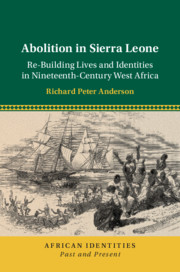Book contents
- Abolition in Sierra Leone
- African Identities: Past and Present
- Abolition in Sierra Leone
- Copyright page
- Dedication
- Contents
- Illustrations
- Acknowledgments
- Notes on the Text
- Abbreviations
- Introduction
- 1 Liberated African Origins and the Nineteenth-Century Slave Trade
- 2 Their Own Middle Passage
- 3 “Particulars of disposal”
- 4 Liberated African Nations
- 5 Kings and Companies
- 6 Religion, Return, and the Making of the Aku
- 7 The Cobolo War
- Conclusion
- Appendices
- Select Bibliography
- Index
Introduction
Sierra Leone: African Colony, African Diaspora
Published online by Cambridge University Press: 09 January 2020
- Abolition in Sierra Leone
- African Identities: Past and Present
- Abolition in Sierra Leone
- Copyright page
- Dedication
- Contents
- Illustrations
- Acknowledgments
- Notes on the Text
- Abbreviations
- Introduction
- 1 Liberated African Origins and the Nineteenth-Century Slave Trade
- 2 Their Own Middle Passage
- 3 “Particulars of disposal”
- 4 Liberated African Nations
- 5 Kings and Companies
- 6 Religion, Return, and the Making of the Aku
- 7 The Cobolo War
- Conclusion
- Appendices
- Select Bibliography
- Index
Summary
The Introduction traverses the early history of the Sierra Leone colony from its founding in 1787 to 1808. Rather than re-rehearse the colony’s early history at length, the emphasis is here placed on the origins and cultures of Sierra Leone’s colonists in the years prior to the arrival of the first Liberated Africans. Within the historiography on Sierra Leone there exists a dichotomy between the first three waves of immigrants from London, Nova Scotia, and Jamaica, referred to collectively as “settlers” and the later involuntary arrival of Liberated Africans. The standard interpretation of nineteenth-century Sierra Leone is that the three cohorts of voluntary migrants formed a cohesive society into which Liberated Africans were “incorporated” or “absorbed.” This Introduction argues that this common narrative of Liberated African incorporation and socialization into a pre-existing settler society is untenable, given the preponderance of emancipated Africans arriving on an annual basis and the nature of their interaction with Settlers.
Keywords
- Type
- Chapter
- Information
- Abolition in Sierra LeoneRe-Building Lives and Identities in Nineteenth-Century West Africa, pp. 1 - 29Publisher: Cambridge University PressPrint publication year: 2020



